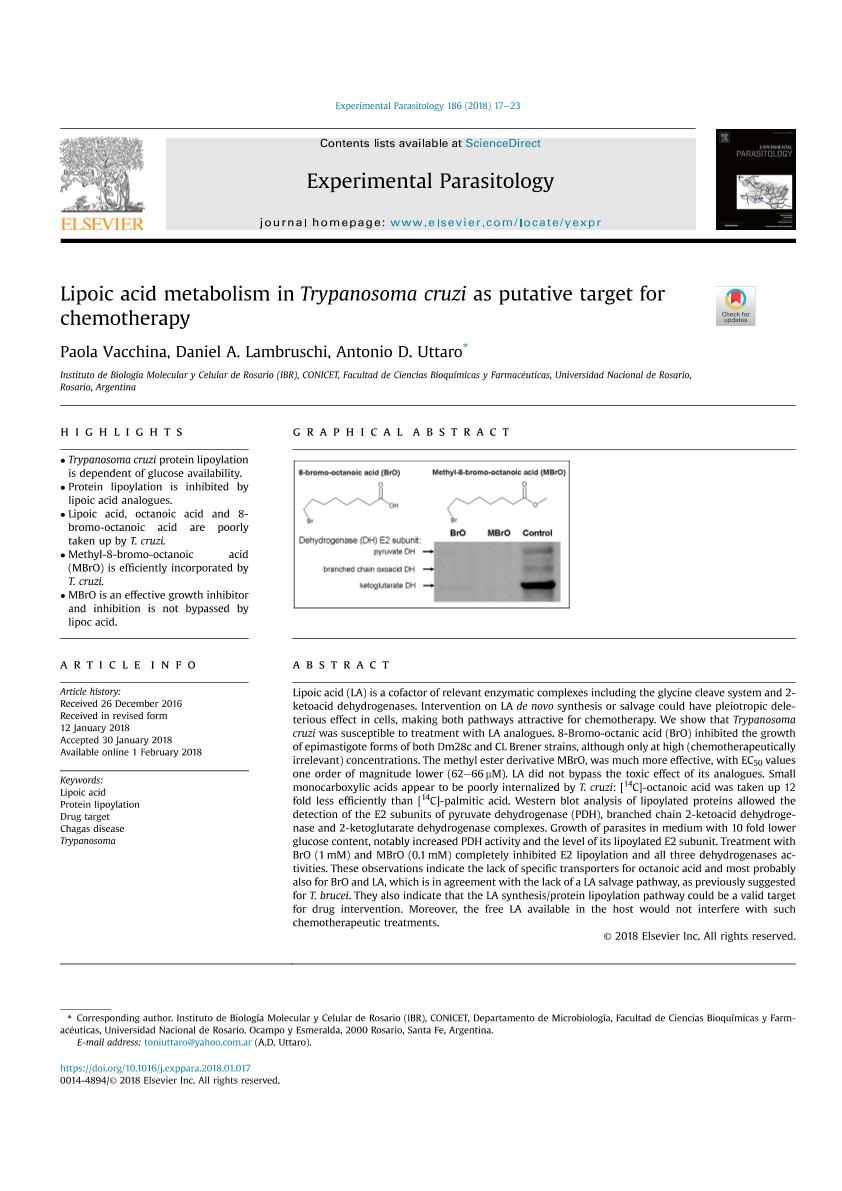Mostrar el registro sencillo del ítem
dc.contributor.author
Vacchina, Paola

dc.contributor.author
Lambruschi, Daniel Andrés

dc.contributor.author
Uttaro, Antonio Domingo

dc.date.available
2019-11-25T20:53:06Z
dc.date.issued
2018-03
dc.identifier.citation
Vacchina, Paola; Lambruschi, Daniel Andrés; Uttaro, Antonio Domingo; Lipoic acid metabolism in Trypanosoma cruzi as putative target for chemotherapy; Academic Press Inc Elsevier Science; Experimental Parasitology; 186; 3-2018; 17-23
dc.identifier.issn
0014-4894
dc.identifier.uri
http://hdl.handle.net/11336/89754
dc.description.abstract
Lipoic acid (LA) is a cofactor of relevant enzymatic complexes including the glycine cleave system and 2-ketoacid dehydrogenases. Intervention on LA de novo synthesis or salvage could have pleiotropic deleterious effect in cells, making both pathways attractive for chemotherapy. We show that Trypanosoma cruzi was susceptible to treatment with LA analogues. 8-Bromo-octanic acid (BrO) inhibited the growth of epimastigote forms of both Dm28c and CL Brener strains, although only at high (chemotherapeutically irrelevant) concentrations. The methyl ester derivative MBrO, was much more effective, with EC50 values one order of magnitude lower (62–66 μM). LA did not bypass the toxic effect of its analogues. Small monocarboxylic acids appear to be poorly internalized by T. cruzi: [14C]-octanoic acid was taken up 12 fold less efficiently than [14C]-palmitic acid. Western blot analysis of lipoylated proteins allowed the detection of the E2 subunits of pyruvate dehydrogenase (PDH), branched chain 2-ketoacid dehydrogenase and 2-ketoglutarate dehydrogenase complexes. Growth of parasites in medium with 10 fold lower glucose content, notably increased PDH activity and the level of its lipoylated E2 subunit. Treatment with BrO (1 mM) and MBrO (0.1 mM) completely inhibited E2 lipoylation and all three dehydrogenases activities. These observations indicate the lack of specific transporters for octanoic acid and most probably also for BrO and LA, which is in agreement with the lack of a LA salvage pathway, as previously suggested for T. brucei. They also indicate that the LA synthesis/protein lipoylation pathway could be a valid target for drug intervention. Moreover, the free LA available in the host would not interfere with such chemotherapeutic treatments.
dc.format
application/pdf
dc.language.iso
eng
dc.publisher
Academic Press Inc Elsevier Science

dc.rights
info:eu-repo/semantics/openAccess
dc.rights.uri
https://creativecommons.org/licenses/by-nc-nd/2.5/ar/
dc.subject
CHAGAS DISEASE
dc.subject
DRUG TARGET
dc.subject
LIPOIC ACID
dc.subject
PROTEIN LIPOYLATION
dc.subject
TRYPANOSOMA
dc.subject.classification
Bioquímica y Biología Molecular

dc.subject.classification
Ciencias Biológicas

dc.subject.classification
CIENCIAS NATURALES Y EXACTAS

dc.title
Lipoic acid metabolism in Trypanosoma cruzi as putative target for chemotherapy
dc.type
info:eu-repo/semantics/article
dc.type
info:ar-repo/semantics/artículo
dc.type
info:eu-repo/semantics/publishedVersion
dc.date.updated
2019-10-21T19:58:36Z
dc.journal.volume
186
dc.journal.pagination
17-23
dc.journal.pais
Países Bajos

dc.journal.ciudad
Amsterdam
dc.description.fil
Fil: Vacchina, Paola. Consejo Nacional de Investigaciones Científicas y Técnicas. Centro Científico Tecnológico Conicet - Rosario. Instituto de Biología Molecular y Celular de Rosario. Universidad Nacional de Rosario. Facultad de Ciencias Bioquímicas y Farmacéuticas. Instituto de Biología Molecular y Celular de Rosario; Argentina
dc.description.fil
Fil: Lambruschi, Daniel Andrés. Consejo Nacional de Investigaciones Científicas y Técnicas. Centro Científico Tecnológico Conicet - Rosario. Instituto de Biología Molecular y Celular de Rosario. Universidad Nacional de Rosario. Facultad de Ciencias Bioquímicas y Farmacéuticas. Instituto de Biología Molecular y Celular de Rosario; Argentina
dc.description.fil
Fil: Uttaro, Antonio Domingo. Consejo Nacional de Investigaciones Científicas y Técnicas. Centro Científico Tecnológico Conicet - Rosario. Instituto de Biología Molecular y Celular de Rosario. Universidad Nacional de Rosario. Facultad de Ciencias Bioquímicas y Farmacéuticas. Instituto de Biología Molecular y Celular de Rosario; Argentina
dc.journal.title
Experimental Parasitology

dc.relation.alternativeid
info:eu-repo/semantics/altIdentifier/doi/https://doi.org/10.1016/j.exppara.2018.01.017
dc.relation.alternativeid
info:eu-repo/semantics/altIdentifier/url/https://www.sciencedirect.com/science/article/pii/S0014489416304088
Archivos asociados
